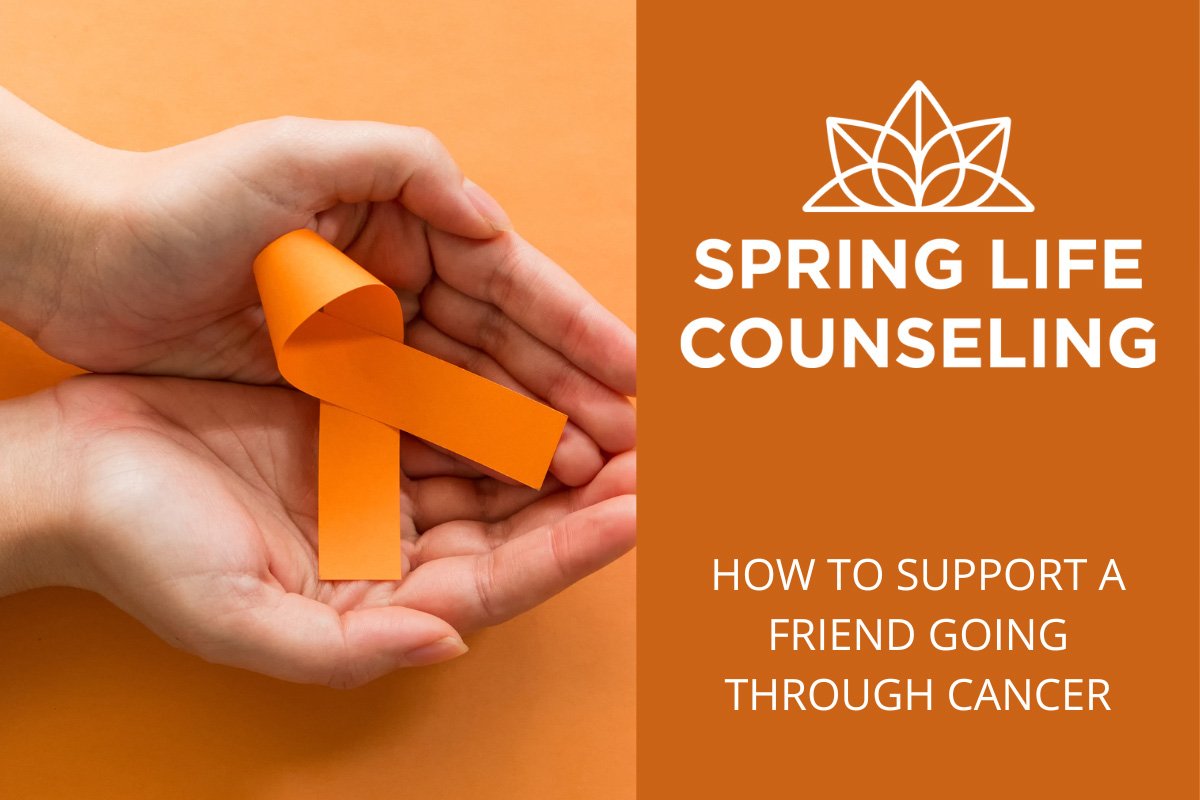How to Support A Friend Going Through Cancer
Cancer Can Suck It.
I have had the pleasure of walking with several clients through their cancer diagnosis, treatment, and recovery. It really is an honor to help support someone going through the fight of their life.
When my friend Amy received her cancer diagnosis, I felt SUPER helpless. It was very different for me to support as a friend than as a therapist. I didn’t really know what to do so I just started googling, cooking and buying stuff. Haha. So much so that she and her husband coined me “Cancer Santa.” I’ll take it!
Amy said that having cancer is like giving a big speech or singing a special solo. Those in the crowd may know every word and be rooting for you with all they have, but only you can give the performance. No one in the audience will really be able to know what it’s like on stage.
So…what’s a friend to do when they’re a spectator for the hardest performance of a person’s life?
Below, you’ll find some of the things I did, some of the things I should have done, and some of the things other friends did that were super helpful. It’s not exhaustive, but I just wanted to throw out some pointers for people like me, who want to handle this situation well from the audience.
How to Support a Friend Going Through Cancer.
Show up. Get there. ASAP.
Match their energy.
Learn to sit well. Hold space. There’s no fixing it. Just be present.
Be mindful of your own tendency to imagine the worst case scenario.
Don’t assume you know where they are at mentally/emotionally. This is their story, not yours.
Ask how they’d like to be supported when they’re down.
Ask how they’d like to be supported when they’re up!
“Be cool” if they are having a bad day and take it out on you.
This typically shows how close they feel to you.
Consider it a compliment!
There will be a moment for all of it. Buckle up.
Shock. Hope. Hopelessness. Sadness. Overwhelm. Anger. Repeat. Every emotion is fair game when you’re experiencing something like this.
Ride the rollercoaster with them.
It’s not always time for a pep talk. Read the room!
Ask, “what would feel good to you right now?”
If they have a spiritual life, religious topics might feel comforting or it could feel like a minefield. When in doubt, ask!
Be careful with your touch.
If their cancer journey involves surgery or radiation, both of these can be particularly painful to the touch. Just be mindful when you hug! When in doubt: ask!
For spouses/partners, this will have sexual implications, limits on prolongued touching, how you wash and use sheets, sharing the toilet. Your doctor will give you guidelines for this but I just wanted to include here in case you are an in-home partner.
Be consistent. This is a marathon, not a sprint.
Some of my clients who have walked through cancer talk about the blessing of getting a supportive or funny meme, a song, whatever seems caring, but with the important caveat, “no need to respond.”
Making the “support giver” constantly feel good about their support being appreciated should not be on the to-do list of the patient.
The patient is going to worry that you’ll run out of care or compassion. (And truthfully, several people probably will, for various reasons.) Or that they’ll start to feel like a burden.
Your consistency will do a lot to alleviate this concern.
Start well and finish well and don’t fall off in the middle. You’ve gotta be a better friend than that!
Do your own research.
It’ll be great to be aware of what the normal treatment plan is for their type of cancer.
Understand what their cancer’s stage means.
Having your own knowledge base will be a gift to them as they won’t have to take on the burden of educating you.
Fill up your calendar with important appointments and surgery dates. Plan your support accordingly.
Find someone who has experienced a similar cancer and ask if you can interview them.
Know who else is in their support system so you can coordinate if necessary.
You are now part of the Casserole Brigade. Enlist as many recruits as you can!
I enlisted people who didn’t even know my friend because I figured the more cooks, the better.
Meal Train is a free service if you want to set up a food rotation.
If cooking isn’t your thing, you may find a local business that delivers prepared food. You could have people sign up to sponsor days or weeks of this service.
Important note!!
People’s taste buds can change throughout cancer treatment. They may want to avoid their favorite foods so as to not “ruin” them by being nauseous.
They may have certain tastes/textures/smells that don’t normally bother them but do when they’re receiving treatment.
The person experiencing cancer may not even have much of an appetite but the other members of their household will still need to be fed!
Help is best given, not offered.
Pick up their dirty laundry.
“I am coming over to get your laundry. Put the basket outside if you don’t feel like talking.”
“I don’t care how many loads it is. Stop talking and let me do this.”
Cut their grass. (Or hire someone, if you’re bougie.)
No need to give notice for this one. They’ll figure it out when they hear the mower.
Consider their spouse.
The spouse is often the biggest support person in a moment like this.
Make sure they’re getting the rest they need. Offer to hang out with your friend while the spouse has some self-care time.
Make sure your check-ins address how they are doing, and not just how the patient is doing. Though, that is often intermingled.
Empathize and normalize. These should be your go-to responses.
Consider their kids.
Just throw them in your vehicle and bring them back fed and tired.
Go get the kids on your way to any activity they’d normally be at.
Not sure if their kids like you? Bring snacks.
Bring the kids quiet activities.
Coloring, beads to make things from, your old school Nintendo.
Bring pre-packed kid-friendly breakfasts and lunches if school is in session (...or even if not…who gets mad about a breakfast sandwich?).
Consider their pets.
Take ole Rufus for a walk. Bring him a new chew toy. Bless his little doggo heart.
See what kind of pet food they need.
Give their dog a bath or take them to the groomer if they’re fancy like a Goldendoodle.
People feel guilty over their pets not having as much activity or attention as normal. This may seem small but it has a nice impact!
Cancer Santa:
First I went to Etsy to buy a bunch of ridiculous greeting cards about cancer.
I also got an awesome sweatshirt here because, just because you have cancer doesn’t mean you can’t be fashionable.
For funsies, this actually looks super practical with port access.
Prior to surgery, I got this fantastic bra/robe combo (The Brobe), which was specific to the type of cancer my friend was diagnosed with. It received rave reviews!
I ordered some essential oils that are said to help with nausea and some that I thought smelled calming.
IMPORTANT NOTE: along with taste preferences/aversions, scents can be a real stomach turner.
Closer to chemo, I went on Amazon (disclaimer: links given here are affiliate links) to find things like anti-nausea pops, hair turbans, socks, lotions to combat dry/cracked skin (and for skin issues related to radiation as well), dry mouth lozenges and lemon candies for the same issue, an oral wash for dry mouth, a travel pillow for resting during chemo, car pillow to keep the seat belt off of the surgery site and ports, a lace sleep cap to make sleeping more comfortable as your hair grows back, and a cool water bottle. Plus anything else that seemed reasonable.
Fragrances are a touchy topic. Think about this if you order lotions, soaps, etc.
A chemo blanket would also be a great gift! Supposedly you get pretty cold when the IV’s are administered and you have to sit there a good while.
Connect with your own support system. Supporting someone going through cancer treatment can be heavy for those caring for the patient. This journey is certainly not yours, but when you feel overwhelmed by what’s going on, look to your own support system and not the patient for a listening ear.
A final note about longevity:
While cancer treatment may come to an end, so much of cancer never fully comes to a conclusion. Surgery scars altering your appearance, lymphedema, fatigue, weight issues, continued doctors appointments, medication management. Etc. Etc. Etc.
Amy hilariously said, “Surviving cancer sucks! I should have died while I had the chance!” (We are likely to use some dark humor to get through life.)
The point is: it’s a life changing diagnosis. And to be a good friend is to offer support through all the different chapters.

